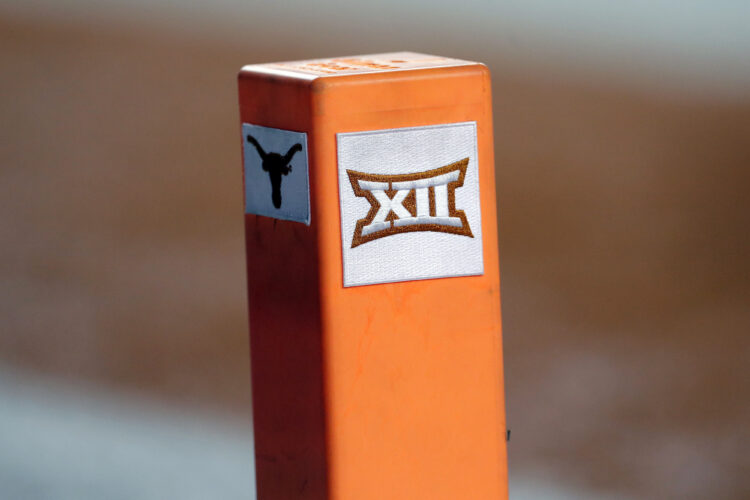Big 12 smoke as thick as ever for BYU

Eric Gay, Associated Press
In this Sept. 15, 2018, photo, the Big 12 Conference logo is seen on a Texas pylon during a game against USC in Austin, Texas.For BYU fans who have already been through two rounds of Big 12 Conference expansion only to see others (like TCU) added — or the time five years ago the league solicited sales pitches only to add nobody at all — the impending departures of Texas and Oklahoma to the SEC may finally be landing the Cougars a spot in the conference.
Multiple outlets reported Friday that the Big 12’s expansion process is picking up speed and official invites may become known as soon as next week, going to BYU, Cincinnati, Houston and Central Florida.
The timeline of those moves is yet to be known, but BYU may have contractual flexibility to join sooner than the rest given its status as an independent in football. Though Texas and Oklahoma are not set to leave for the SEC for several years, it’s believed both sides may want to rip off the Band-Aid and expedite that process if an agreement can be reached.
Brett McMurphy, known for his time nailing breaking news with ESPN during the first wave of realignment 10 years ago that saw Utah go to the Pac-12 and BYU go independent in football, reports BYU is the Big 12’s “clear” top choice and the league is targeting members for all sports.
The end result with four additions and two subtractions, whenever it is completed, would have the Big 12 back to 12 members.
Longtime college sports writer Pat Forde joined Ross Dellenger in a Sports Illustrated report Friday that says the four schools will apply for membership next week and “then could be approved for admission in a meeting of Big 12 presidents Sept. 10 … The league has the eight votes needed for expansion.”
Pete Thamel of Yahoo Sports reports 2023 is a reasonable expectation for the four schools to join. Many publicly available contracts for BYU football games include a stipulation that the contracts can be canceled without penalty if BYU obtains membership in a conference with at least four current Power 5 teams in it.
Scheduling issues aside, the Big 12 would find itself well above the status of the Mountain West and, after taking three of its best teams, the American Athletic Conference, but may find itself perceived outside the other four powers (ACC, Big Ten, Pac-12, SEC) once Texas and Oklahoma make their moves.
Still, if it provides stability to all schools involved, BYU would get consistently good football schedules without the enormous legwork of scheduling 12 games from scratch each season.
And that’s to say nothing of the kind of basketball conference the new Big 12 would be, which could have implications on how long Mark Pope might stay at BYU to coach men’s basketball.
Remaining Big 12 members would include reigning national champion Baylor, Kansas, Texas Tech, Oklahoma State and West Virginia, with BYU, Houston and Cincinnati joining the fold to make a rich group of regular NCAA Tournament teams. It would rival the ACC, or may overtake it, as the best men’s basketball league in the country and would bring a slate of excellent teams to Provo every year.
